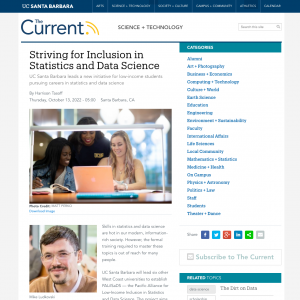Award Date:
UC Santa Barbara leads a new initiative for low-income students pursuing careers in statistics and data science
UCSB Professor Michael Ludkovski will lead the Pacific Alliance for Low-Income Inclusion in Statistics and Data Science (PALiSaDS). This 7-school cohort of West Coast universities aims to "broaden and diversify training for statistics and data science careers by providing a bridge between undergraduate and graduate programs." The project is funded by a $5 million, five-year grant from the National Science Foundation (award #2221421), which will provide scholarships to approximately 115 talented undergraduate students studying statistics and data science and provide continued support for at least 65 of them over two years of graduate studies.
The UCSB Current featured an article by Harrison Tasoff on October 13 that does a great job of summarizing this exciting, new effort.
Participating schools:
- University of California, Santa Barbara
- University of California, Irvine
- California Polytechnic State University, San Luis Obispo
- University of Washington
- California State University, Monterey Bay
- California State University, East Bay
- San Diego State University
From the NSF description:
The overall goal of this project is to increase STEM degree completion of low-income, high-achieving undergraduates with demonstrated financial need. Additional project goals and aims include: (a) to offer a cohort-based program that supports students financially via scholarships lasting up to 3 years; (b) provide scholars with academic and co-curricular experiences designed to facilitate placement into careers in statistics and data science; and (c) offer interventions to enhance scholars’ community cultural capital. Project research will use surveys and interviews to study three main themes: (a) how counterspaces and other kinds of community develop and support scholars’ progress towards their goals; (b) how scholars’ community cultural wealth shapes and is shaped by the counterspaces and communities that develop; and (c) how students’ low-income status and other identities impact key counterspaces and communities and influence scholars’ choices and outcomes. Project evaluation will provide formative and summative feedback on all aspects of the project to support efficient progress towards goals. This project is funded by NSF’s Scholarships in Science, Technology, Engineering, and Mathematics program, which seeks to increase the number of low-income academically talented students with demonstrated financial need who earn degrees in STEM fields. It also aims to improve the education of future STEM workers, and to generate knowledge about academic success, retention, transfer, graduation, and academic/career pathways of low-income students.
This award reflects NSF's statutory mission and has been deemed worthy of support through evaluation using the Foundation's intellectual merit and broader impacts review criteria.


